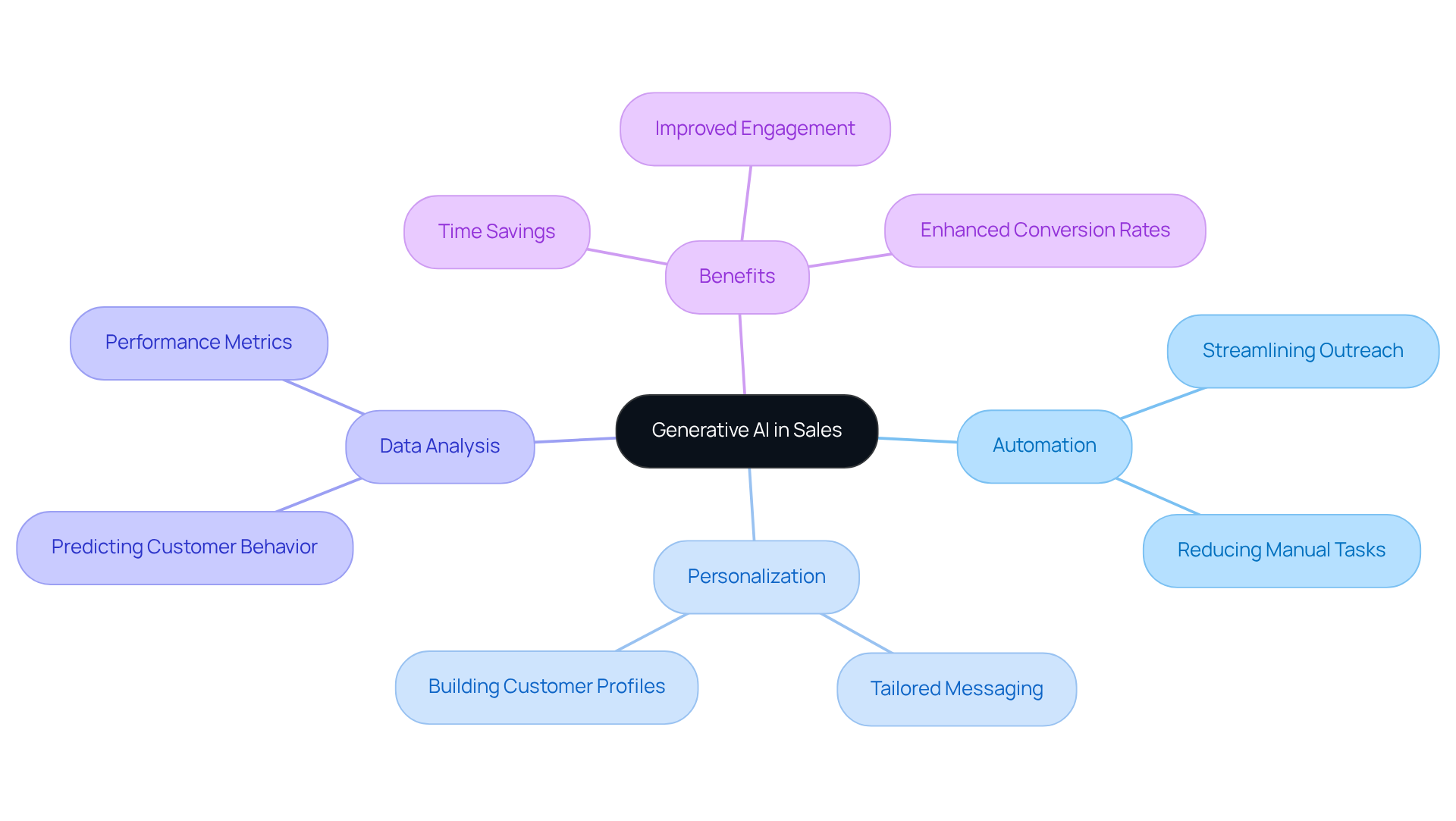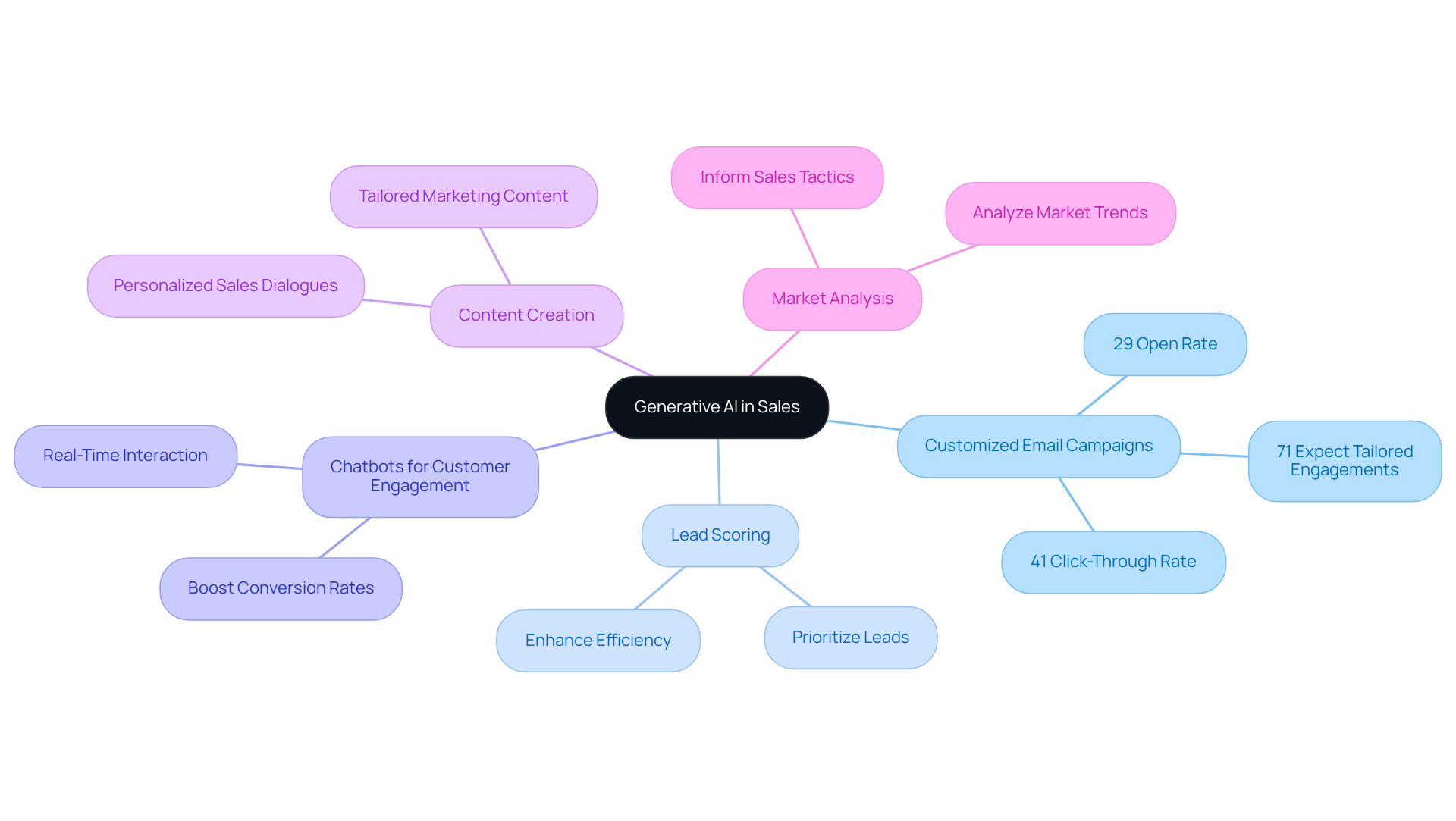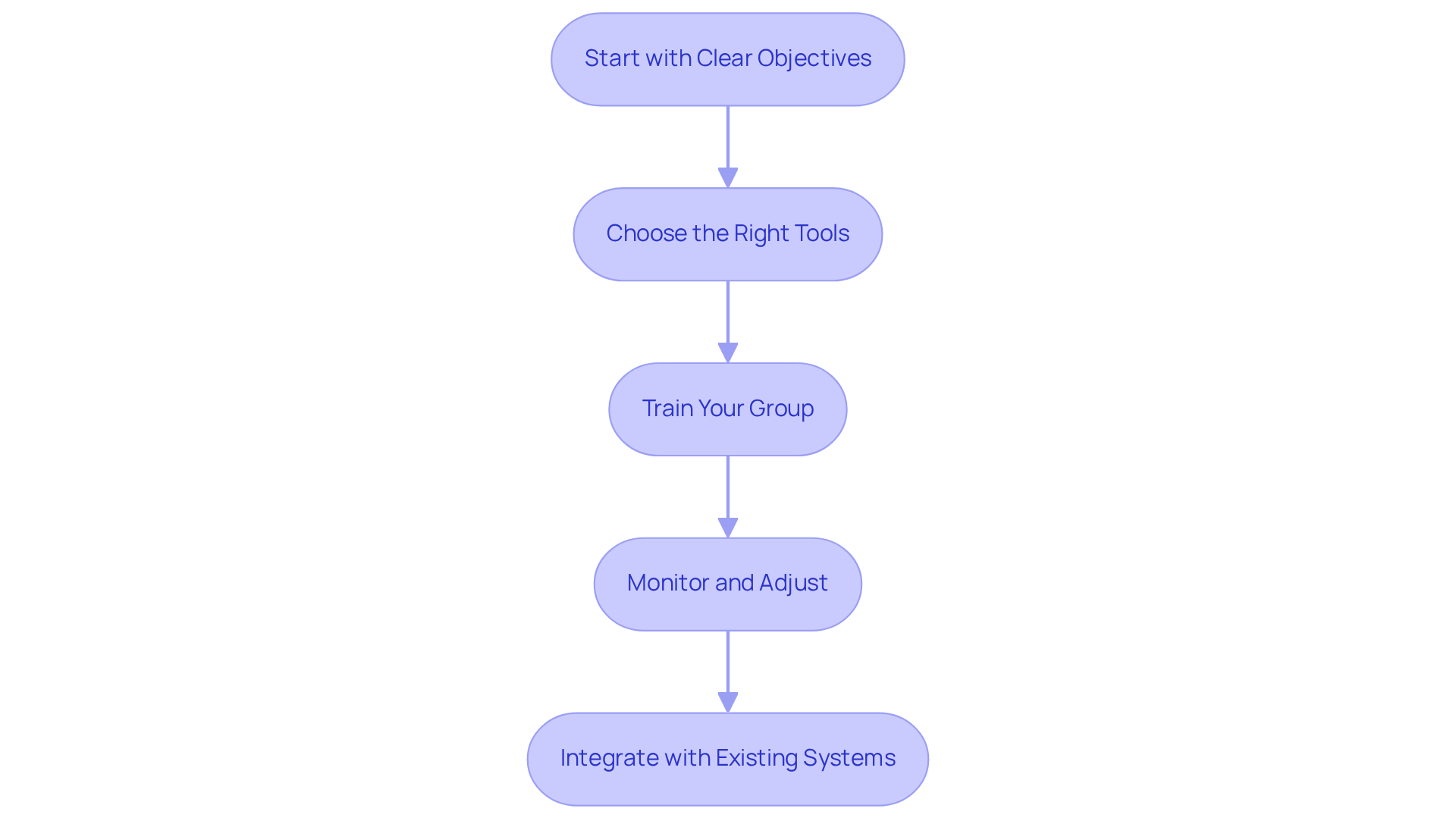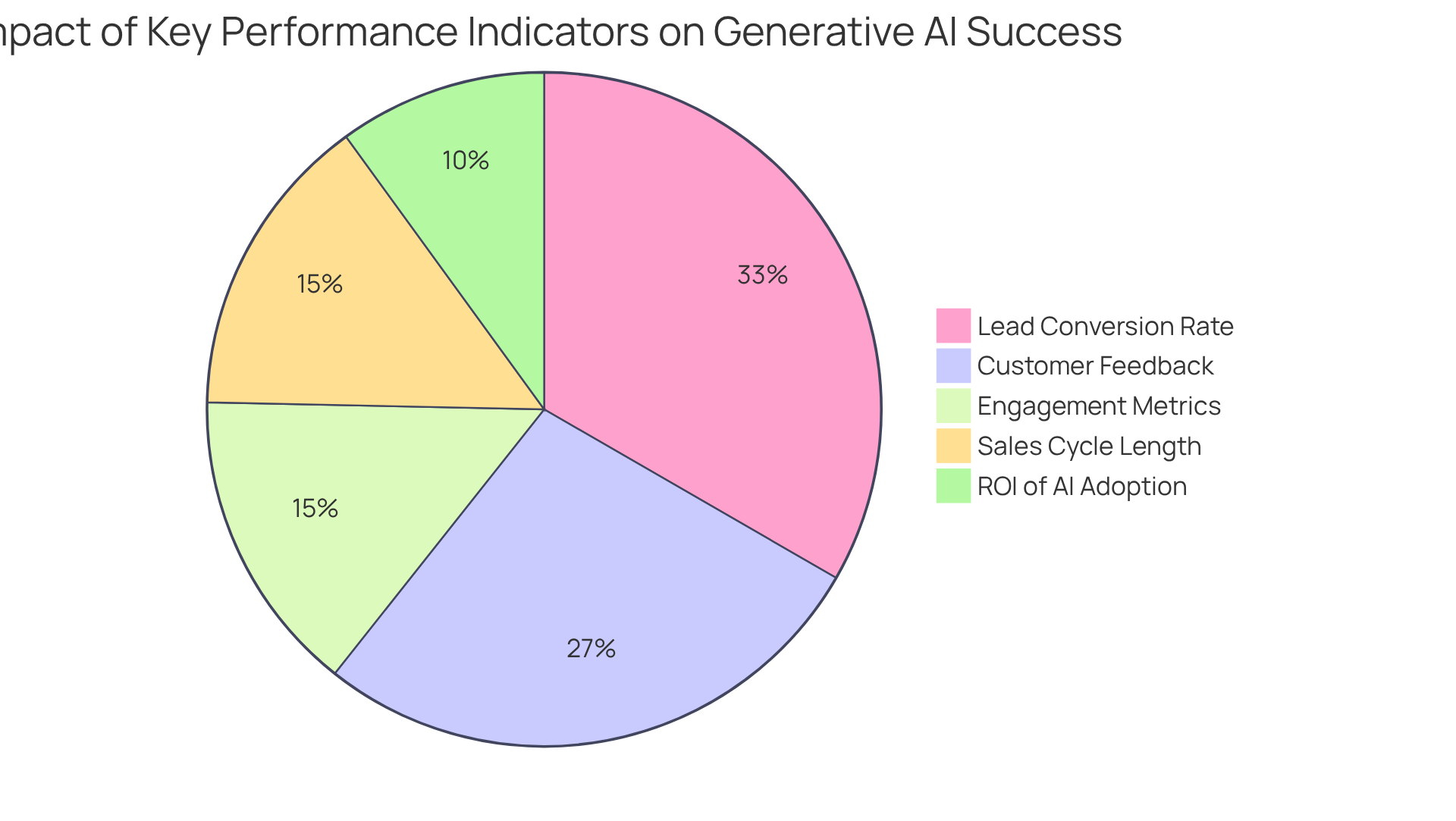Overview
In today’s competitive landscape, small businesses often face the challenge of attracting and retaining clients. Have you ever wondered how generative AI could be the solution you've been seeking? This article explores strategies for implementing generative AI in sales, emphasizing its remarkable potential to enhance client acquisition and streamline sales processes.
Imagine being able to send personalized email campaigns that truly resonate with your audience. By utilizing lead scoring, you can identify the most promising prospects, ensuring that your efforts are focused where they matter most. Additionally, customer engagement chatbots can provide timely responses, fostering relationships that lead to increased satisfaction and loyalty. These specific applications illustrate how generative AI can significantly improve efficiency and conversion rates in your sales efforts.
As you consider these strategies, think about how they could transform your business. Together, we can navigate the complexities of sales, empowering you to achieve greater success. By embracing generative AI, you can not only enhance your sales processes but also create meaningful connections with your clients, ultimately leading to a thriving business.
Introduction
In today's fast-changing sales landscape, small businesses are navigating the dual challenge of remaining competitive while managing limited resources. It's understandable to feel overwhelmed. Generative AI stands out as a transformative ally, offering innovative solutions that can help streamline outreach, personalize communication, and analyze customer behavior effectively. Yet, a crucial question arises: how can small enterprises harness this technology to enhance their sales strategies while also navigating potential pitfalls?
By exploring strategies and best practices for integrating generative AI into sales processes, we can uncover a pathway to success that many small business owners may not yet realize. Together, we can learn how to make the most of these advancements, ensuring that your business not only survives but thrives in this dynamic environment. Let's embark on this journey to empower your sales approach and embrace the opportunities that lie ahead.
Define Generative AI and Its Role in Sales
Generative AI represents a powerful ally for small business owners, offering algorithms that can produce new content, ideas, or solutions from existing data. Imagine the relief of automating repetitive tasks, personalizing outreach efforts, and analyzing customer data to predict behaviors—this is the role generative AI plays in commerce. For small enterprises, this means a significant reduction in time spent on manual outreach, while also enhancing the effectiveness of sales strategies. By embracing generative AI, companies can craft tailored messages that resonate with prospective clients, fostering stronger engagement and improved conversion outcomes.
Consider platforms like Wayy.ai, where users can connect with each month and receive daily email updates on essential metrics. These updates include insights on how many leads were reached, who expressed interest, and the conversion rate along with its improvements. This clearly illustrates the tangible benefits of integrating such technology into your business processes.
Furthermore, Wayy.ai offers an affordable solution for small business owners eager to enhance their client acquisition efforts. Together, we can navigate these challenges and achieve success in your outreach endeavors. Remember, you are not alone in this journey; we understand your challenges and are here to support you every step of the way.

Explore Key Use Cases of Generative AI in Sales
Generative AI for sales provides a wealth of opportunities for small businesses aiming to enhance their client acquisition strategies. Let’s explore some key applications that can truly make a difference:
- Customized Email Campaigns: Imagine automating the creation of personalized email content that resonates with your customers. This approach can lead to significantly higher open and response rates—think about a 29% open rate and a 41% click-through rate, as highlighted by Falak Preet Kaur. With 71% of consumers expecting from brands, it’s clear that this method is crucial in today’s marketing landscape.
- Lead Scoring: By leveraging AI to sift through vast amounts of data, you can prioritize leads based on their likelihood to convert. This means your marketing team can focus on the most promising opportunities, enhancing both efficiency and effectiveness in outreach.
- Chatbots for Customer Engagement: Picture having AI-driven chatbots that engage with potential clients in real time. These chatbots can answer inquiries and guide prospects through the marketing process, enriching their experience and boosting conversion rates. With the ability to provide high-quality, immediate responses, generative AI for sales chatbots simulate human-like conversations that foster deeper engagement.
- Content Creation: Generative AI for sales can assist you in crafting personalized sales dialogues, proposals, and marketing content tailored for specific audiences. This relevance makes your communications more impactful and engaging for potential clients.
- Market Analysis: Utilizing AI to analyze market trends and customer feedback can yield valuable insights that inform your sales tactics and product offerings. This data-driven approach not only helps you stay competitive but also responsive to the ever-evolving market demands.
While the benefits of generative AI in commerce are substantial, it’s important to remain mindful of potential risks, such as over-reliance on technology and data inaccuracies. Striking a balance between AI automation and personalized interactions is key to maintaining effective marketing strategies. For instance, companies that have successfully implemented personalized email campaigns have seen remarkable improvements in engagement and conversion rates, showcasing the tangible benefits of these innovative technologies. Together, we can navigate these advancements and achieve success in your business journey.

Implement Generative AI: Best Practices for Small Businesses
To effectively implement generative AI in sales, small businesses can benefit from following these best practices that truly understand your needs:
- Start with Clear Objectives: Begin by defining your goals for using generative AI. Are you looking to boost lead generation, enhance customer engagement, or improve conversion rates? Research shows that organizations with well-defined objectives are more likely to achieve successful AI implementation. By clarifying your aims, especially in terms of utilizing generative AI for sales, you set the stage for success.
- Choose the Right Tools: It’s essential to select AI tools that align with your specific needs. Platforms like Wayy.ai can streamline outreach procedures and provide valuable insights into customer behavior, making them ideal for small business marketing strategies. Choosing the right tools means you’re investing in solutions that genuinely support your growth.
- Train Your Group: Equip your marketing team with the knowledge they need to effectively use generative AI tools. Conduct training sessions to familiarize them with generative AI for sales technology, ensuring they can leverage its full potential. Remember, empowering your team fosters confidence and capability.
- Monitor and Adjust: Regularly assess how your AI-driven approaches are performing. Use analytics to identify what’s working well and where adjustments are necessary. Continuous improvement is key to maximizing the benefits of generative AI for sales, and your commitment to refinement will pay off.
- Integrate with Existing Systems: Ensure that your generative AI tools can seamlessly connect with your current CRM and marketing systems. This integration maximizes efficiency and enhances data utilization, allowing for a more unified sales approach with generative AI for sales. Together, we can create a more that supports your business goals.

Measure Success and Optimize Generative AI Strategies
To effectively measure the success of generative AI strategies, small businesses should focus on some key performance indicators (KPIs) that truly matter:
- Lead Conversion Rate: This important metric tracks the percentage of leads converting into customers, giving you insight into how effective your outreach efforts are. Many companies utilizing AI have reported increases in conversion rates by as much as 50%. This highlights just how impactful these technologies can be on lead generation.
- Engagement Metrics: Keeping an eye on open rates, click-through rates, and response rates for your email campaigns is crucial for understanding customer interest and engagement. Did you know that 82% of B2B buyers prefer interactive content like quizzes and ROI calculators? This statistic underscores the significance of engagement metrics in AI-driven email campaigns.
- Sales Cycle Length: It’s essential to analyze how generative AI affects the time it takes to close deals. Companies that have embraced AI tools have seen their sales cycles shorten by as much as 22%, leading to quicker revenue generation.
- Customer Feedback: Gathering feedback from your clients about their experiences with AI-driven interactions is invaluable. This qualitative data can pinpoint areas for improvement and enhance customer satisfaction. In fact, 41% of respondents view improved customer experience as a top benefit of responsible AI practices.
- Evaluating the ROI of adopting generative AI for sales involves assessing the costs of these tools against the income generated from increased transactions. Companies investing in AI have reported revenue increases ranging from 3% to 15%, along with an uplift in ROI of 10% to 20%. By consistently refining your approaches based on these metrics, small businesses can adapt to changing market conditions and continue to foster growth.
By concentrating on these KPIs, small businesses can effectively track their outreach effectiveness and make informed decisions to enhance their sales strategies. Together, we can and achieve success.

Conclusion
Embracing generative AI offers a transformative opportunity for small businesses eager to enhance their sales strategies. By leveraging this innovative technology, you can automate routine tasks, personalize customer interactions, and gain valuable insights into consumer behavior. The potential for improved engagement and conversion rates is significant, making generative AI an essential tool for those of you who want to thrive in a competitive marketplace.
Throughout this article, we’ve explored various applications of generative AI, highlighting the benefits of:
- Customized email campaigns
- Lead scoring
- Real-time customer engagement through chatbots
It’s important to:
- Set clear objectives
- Select the right tools
- Train your staff
- Continuously optimize your strategies
These practices not only facilitate effective implementation but also ensure that the technology aligns with your business goals.
Ultimately, integrating generative AI into your sales processes is not just a trend; it’s a vital step toward achieving sustainable growth and success. By focusing on key performance indicators and adapting your strategies based on real-time data, you can navigate the complexities of the modern market. The call to action is clear: embrace generative AI to unlock new possibilities and drive your sales efforts to unprecedented heights. Together, we can achieve success and create a brighter future for your business.
Frequently Asked Questions
What is generative AI?
Generative AI refers to algorithms that can create new content, ideas, or solutions based on existing data, making it a valuable tool for small business owners.
How does generative AI benefit small businesses in sales?
Generative AI helps small businesses automate repetitive tasks, personalize outreach efforts, and analyze customer data to predict behaviors, leading to a reduction in time spent on manual outreach and enhanced sales strategies.
What specific improvements can small businesses expect from using generative AI?
Small businesses can expect to craft tailored messages that resonate with prospective clients, resulting in stronger engagement and improved conversion outcomes.
What is Wayy.ai and how does it relate to generative AI?
Wayy.ai is a platform that allows users to connect with over 60 target clients each month and provides daily email updates on essential metrics, such as lead reach, expressed interest, and conversion rates, showcasing the benefits of integrating generative AI into business processes.
Is Wayy.ai an affordable solution for small business owners?
Yes, Wayy.ai offers an affordable solution for small business owners looking to enhance their client acquisition efforts.




